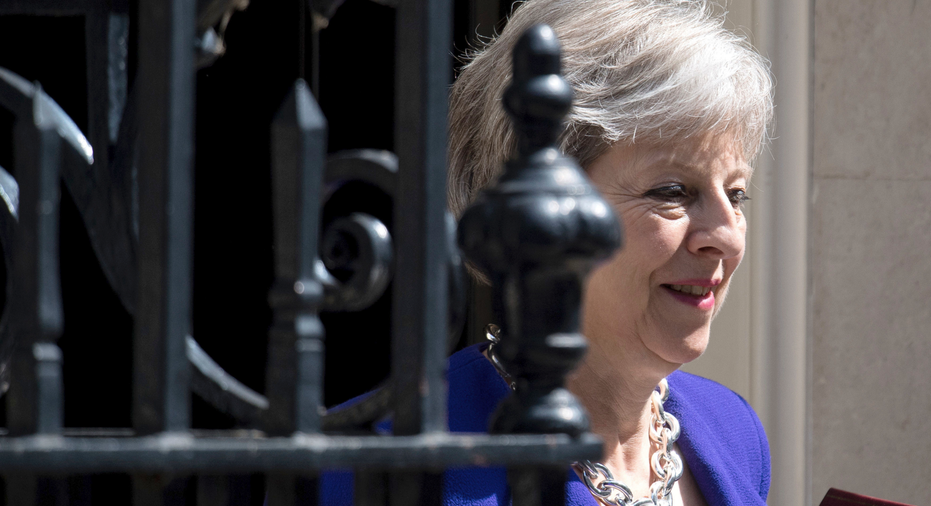After marathon meeting, UK leaders endorse Brexit trade plan

LONDON – British Prime Minister Theresa May corralled her Cabinet inside an English country house for a long, hot day Friday, and announced that the divided government had finally agreed on a plan for a future free-trade deal with the European Union.
The proposal aims to keep the U.K. and the bloc in a free-trade zone for goods, but not for services, which make up the bulk of the British economy.
After almost 12 hours of talks at Chequers, the prime minister's country retreat, May said that "the Cabinet has agreed our collective position for the future of our negotiations with the EU" — a pronouncement akin to the British government equivalent of white smoke from the Vatican announcing the election of a new pope.
But getting the Conservative government to agree with itself may be the easy part. As ministers met behind closed doors — and without their phones, to prevent snooping and leaks — the EU's chief negotiator, Michel Barnier, warned the bloc would not accept anything that treated the union's single market, which allows the free flow of goods and services, as a "big supermarket."
After the British statement, Barnier tweeted that the EU would "assess proposals to see if they are workable & realistic."
At first glance the British proposals sit uneasily with repeated EU warnings that the U.K cannot "cherry pick" the benefits of EU membership, such as access to the tariff-free customs union and single market, without accepting the responsibilities, which include allowing the free movement of EU citizens to the U.K.
The U.K. is firm that it will end free movement, as well as the jurisdiction of the EU's top court in British affairs.
Friday's meeting at the 16th-century manor house 40 miles (65 kilometers) northwest of London came with just nine months to go until the U.K. leaves the bloc, and with the EU warning that time is running out to seal a divorce deal.
Currently Britain is part of the EU's single market — which allows for the frictionless flow of goods and services among the 28 member states — and its tariff-free customs union for goods. That will end after Brexit, but what will replace it remains unclear.
Ever since Britain voted to leave the EU two years ago, its government has been divided between Brexit-backing ministers who want a sharp break from the EU so the U.K. can strike new trade deals around the world, and a more pro-EU group that wants to avoid tariffs and other friction between the U.K. and its biggest trading partner.
That view has been echoed by big manufacturers, including Airbus and Jaguar Land Rover, who warn they could abandon Britain if the EU and the U.K. cannot strike a strong free trade deal. Airbus alone employs some 14,000 workers in Britain.
Airbus chief executive Tom Enders slammed Britain's divided government early Friday, saying "Her Majesty's government still has no clue, or at least no consensus, on how to execute Brexit without severe harm."
Leading pro-Brexit Cabinet ministers, including Foreign Secretary Boris Johnson and Brexit Secretary David Davis, met in private on the eve of Friday's meeting, sparking rumors some could quit rather than agree to May's proposal.
For now, though, May appears to have united the pro-Brexit and pro-EU wings of her government behind a compromise. Under the proposals — which will be published in detail next week — Britain would agree to maintain the same rules as the bloc for trade in goods and agricultural products.
The U.K. will also promise to keep "high regulatory standards" for areas including the environment and employment law, which could ease fears among unions and others that the government plans to slash standards to secure new trade deals.
Under the plan, however, Britain will not seek to stay in the single market for services. The government said it recognized that meant the U.K. and the EU would have less access to each other's markets than they do now.
On customs, the plan calls for the U.K. to use technology at the border to determine whether goods are bound for Britain or the EU, and to charge the appropriate tariffs.
May said the plan would "avoid friction in terms of trade, which protects jobs and livelihoods" — a key concern of ministers who want a "soft" Brexit. She said it would also leave Britain free to strike new trade deals around the world, a major preoccupation of government Brexiteers.
Britain said the proposal would also solve the problem of the border between Northern Ireland and the Republic of Ireland, which will be the U.K.'s only land frontier with an EU member after Brexit. Britain has promised to maintain an invisible border, free of customs posts and other infrastructure, but until now has not said how it plans to achieve that.
In a tacit acknowledgement that Brussels may not like the proposals, the British government said it would step up preparations for a "no deal" Brexit — though it said it strongly favored an agreement.
Initial business reaction was positive. Carolyn Fairbairn, head of the Confederation of British Industry, said the agreement was "a genuine confidence boost."
But arch-euroskeptics accused the government of a betraying Brexit. Former U.K. Independence Party leader Nigel Farage said the proposal was "a sell-out to the global corporates."
___
Associated Press writers Danica Kirka in London and Raf Casert in Brussels contributed to this report.



















